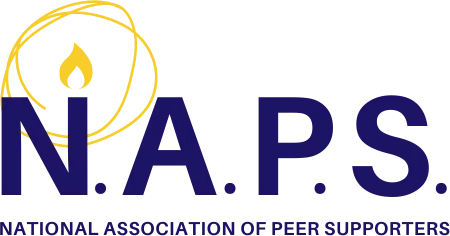Webinar Archive
An archive of all our webinar content for continuing education.
Webinars allow us at N.A.P.S. to actively support your peer supporter and career development. For each webinar you complete, you will receive a certificate confirming your participation, and indicating the accrual of 1 contact hour for Continuing Education Purposes.
If you have a Professional, Ally, Sustainer, Lifetime, or Company Sponsor Membership, all of these webinars are free to access! For guests and registrants, you can purchase lifetime access to webinars on an individual basis.
If you register in advance of a live Zoom call, you can visit the course page to join the call on the day. If you register after the fact, you will have access to a YouTube recording. Be sure to check our webinar archive page for a full listing of our webinars.
Members: You may access all of your courses through this page, or through the Courses Tab in My Account.
Webinar 44
Peer Support in the Time of COVID
Air Date: 08/05/2020
After completing this course, you will be able to:
- Determine the emotional message communicated in the way speakers say the words they use.
- Describe how they can use their paraverbals (inflection, tone, pitch, and pace) to hold space and create safety when providing peer support.
- Describe how to use features provided in online environments to actively and empathically “listen.”
- Use the tools and features of online environments to provide safe, empathic, and effective peer support.
Webinar 43
The “Alternatives to Suicide” Approach
Air Date: 05/28/2020
After completing this course, you will be able to:
- Participants will learn at least three questions to ask someone who is contemplating suicide beyond “Do you have a plan?”
- Participants will be able to identify at least two other supports for someone contemplating suicide beyond an in-patient psychiatric unit or psychiatric drugs.
- Participants will learn the four parts of the V-C-V-C model of Validation, Curiosity, Vulnerability and Community.
Webinar 42
History and Philosophy of Medical Ethics
Air Date:
After completing this course, you will be able to:
- Recognize key events in the history of medical ethics.
- Discuss the ethical schools of thought.
- Describe six ethical principles.
- Discuss elements of ethical decision-making.
- Recognize potential Ethical Minefields in peer support.
Webinar 41
The Tools of Innovation
Air Date: 06/27/2019
After completing this course, you will be able to:
- Describe the five components of the design process presented.
- Describe your understanding of the foundations of youth resiliency.
- List two design thinking tools.
Webinar 40
Empowering Youth As Mental Health Peer Specialists
Air Date: 04/01/2019
After completing this course, you will be able to:
- Examine at least 3 benefits of peer support for youth and young adults.
- Gain an understanding of the foundations of youth resiliency.
- Learn at least 2 interactive engagement activities for mental health peer support specialists to utilize with youth.
Webinar 39
The Hearing Voices Movement: In Dialogue with Voices
Air Date: 03/01/2019
After completing this course, you will be able to:
- Identify at least two common myths about people who hear voices.
- Explain at least two basic points of how the Hearing Voices movement was founded.
- List at least three basic principles of the Hearing Voices approach.
- Explain the importance of meaning making in the growth and healing process of someone who hears voices or sees visions.
Webinar 38
Peer Support and Community Inclusion: My Story
Air Date: 10/05/2018
After completing this course, you will be able to:
- Describe professional centrism.
- Identify how professional centrism affects peer support.
- Recall some of the early funding for peer support research.
- Discuss the observations about community inclusion.
Webinar 37
National Practice Guidelines for Peer Supporters
Air Date: 8/3/2018
After completing this course, you will be able to:
- Identify the differences and the overlap between professional help (paid professionals) and mutual help (natural peer support), especially when the latter is provided in paid work settings;
- Recognize the tensions that arise when the overlap between these paradigms makes it difficult for peers to be completely true to the core values of peer support;
- Identify ways in which applying the National Practice Guidelines can help to resolve these tensions and lead to continuous learning and improvement;
- Recall the key factors that led to the development of the National Association of Peer Specialist and the National Practice Guidelines; and
- Describe the process that was followed for gaining widespread agreement and adoption of the National Practice Guidelines.
Webinar 36
Veteran Homelessness from a Peer Specialist Perspective
Air Date: 7/6/2018
After completing this course, you will be able to:
- Attain basic understanding of who homeless veterans are and where they are living.
- Develop beginning knowledge base of what factors lead to homelessness.
- Leave with an understanding of military culture.
- Understand how military develops resiliency.
- Attain understanding of different interventions for veteran homelessness in VA and within the community.
- Gain understanding of some of the unique nature of veteran peer work.
